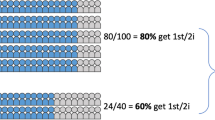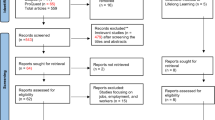Abstract
Research on higher education is an object-focussed area based on a broad range of disciplines. The institutional base is often shaky and diverse. Various characteristics, notably the blurred distinction between the scholar and the reflective practitioner, contribute to considerable tensions, though research on higher education enjoys substantial public attention.
Interest in comparative research on higher education grew in recent years and was reinforced by the community of higher education researchers in Europe. As it can be conceptually and methodologically demanding and fruitful, the growing interest could serve as a stimulus for enhancing a common identity and a growing quality. However, few comparative research designs represent the ideal type of setting a research agenda of clearly defined hypotheses to be tested, and if they do so, the study mostly turns out to be too simplistic due to disregard of the complex context. Rather, most comparative projects are exploratory and most productive in providing unexpected insight.
In addition, comparative research faces many problems of a practical nature. Costly research seems to be granted sufficient funds only if it addresses issues of current political concern. Language barriers and limits of field knowledge often lead to a poor provision of information. International collaborative research teams tend to be vulnerable due to, among others, a heterogeneity of schools of thoughts, spiralling costs and different work styles.
The author argues that comparative studies on higher education are most fruitful in destroying conceptual reasoning based on narrow experience; they are a gold mine for the early stages of conceptual restructuring. They are indispensible for understanding a reality shaped by common international trends, reforms based on comparative observation, growing trans-national activities and partial supra-national integration in higher education. Comparative projects can be regarded as theoretically and methodologically most promising if they are based on a semi-structured research design, whereby the strengths of various conceptual approaches in explaining the phenomena are analysed and the researchers systematically deal with the fact that the project is likely to generate surprising information requiring to restructure the initial conceptual framework.
Similar content being viewed by others
References
Altbach, P.G. (1988). ‘Comparative studies in higher education’, in Postlethwaite, T.N. (ed.), The Encyclopedia of Comparative Education and National Systems of Education. Oxford: Pergamon Press, pp. 66–68.
Altbach, P.G. (ed.) (1991). International Higher Education: An Encyclopedia. 2 vols. New York and London: Garland.
Altbach, P.G. and Kelly, D.H. (1985). Higher Education in International Perspective: A Survey and Bibliography. London: Mansell.
Arimoto, A. and Ehara, T. (eds.) (1996). Daigaku kyoju no kokusai hikaku. Tokyo: Tamagawa daigaku shuppansha.
Blumenthal, P., Goodwin, C., Smith, A. and Teichler, U. (eds.) (1996). Academic Mobility in a Changing World: Regional and Global Trends. London und Bristol, PA: Jessica Kingsley Publishers.
Boyer, E., Altbach, P.G. and Whitelaw, M.J. (1994). The Academic Profession: An International Perspective. Princeton, NJ: Carnegie Foundation for the Advancement of Teaching.
Brennan, J., Kogan, M. and Teichler, U. (1995). ‘Higher education and work: a conceptual Framework’, in Brennan, J., Kogan, M. and Teichler, U. (eds.), Higher Education and Work. London and Bristol, PA: Jessica Kingsley Publishers, pp. 1–24.
Burn, B.B., Cerych, L. and Smith, A. (eds.) (1990). Study Abroad Programmes. London: Jessica Kingsley Publishers.
CEPES/UNESCO (1981). International Directory of Higher Education Research Institutions. Bucharest: UNESCO/CEPES.
Cerych, L. and Sabatier, P. (1986). Great Expectations and Mixed Performance: The Implementation of Higher Education Reforms in Europe. Stoke-on-Trent: Trentham Books.
Clark, B.R. (ed.) (1984). Perspectives on Higher Education: Eight Disciplinary and Comparative Views. Berkeley, Cal.: University of California Press.
Clark, B.R. (ed.) (1985). The School and the University: An International Perspective. Berkeley, Cal.: University of California Press.
Clark, B.R. and Neave, G. (eds.) (1992). The Encyclopedia of Higher Education. 4 vols. Oxford: Pergamon Press.
Demes, H. and Georg, W. (eds.) (1994). Gelernte Karriere: Bildung und Berufsverlauf in Japan. München: Judicium Verlag.
Dierkes, M., Weiler, H.N. and Berthoin Antal, A. (eds.) (1987). Comparative Policy Research: Learning from Experience. Aldershot: Gower.
Enders, J. and Teichler, U. (1995). Der Hochschullehrerberuf im internationalen Vergleich: Ergebnisse einer Befragung über die wissenschaftliche Profession. Bonn: Bundesministerium für Bildung, Wissenschaft, Forschung und Technologie.
Fulton, O. (1992). ‘Higher education studies’, in Clark, B.R. and Neave, G. (eds.), The Encyclopedia of Higher Education. Vol. 3. Oxford: Pergamon Press, pp. 1810–1821.
Goedegebuure, L. and van Vught, F. (1994). ‘Comparative higher education policy studies’, in Goedegebuure, L. and Van Vught, F. (eds.), Comparative Policy Studies in Higher Education. Utrecht: Uitgeverij Lemma, pp. 1–34.
Goldschmidt, D., Teichler, U. and Webler, W-D. (eds.) (1984). Forschungsgegenstand Hochschule. Frankfurt/M. and New York: Campus.
Maassen, P. (1996). Changing political contexts and their effects on quality assessment of teaching and research in European higher education, paper presented to the Academia Europaea Workshop on New Challenges to the Academic Profession, Rotterdam, 30–31 May 1996.
Maiworm, F., Steube, W. and Teichler, U. (1991). Learning in Europe: The ERASMUS Experience. London: Jessica Kingsley Publishers.
Meek, V.L., Goedegebuure, L., Kivinen, O. and Rinne, R. (eds.) (1996). The Mockers and Mocked: Comparative Perspectives on Differentiation, Convergence and Diversity in Higher Education. Oxford: Pergamon Press.
Mitter, W. (1992). ‘Comparative education’, in Clark, B.R. and Neave, G. (eds.), The Encyclopedia of Higher Education, Vol. 3. Oxford: Pergamon Press, pp. 1810–1821.
Neave, G. (1991). ‘A changing Europe: challenges for higher education research’, Higher Education in Europe 16 (3), 3–27.
Neave, G. and van Vught, F.A. (eds.) (1991). Prometheus Bound: The Changing Relationship Between Government and Higher Education in Western Europe. Oxford: Pergamon Press.
‘New trends in research on higher education’ (special issue) (1987), Higher Education in Europe 12 (1).
Nitsch, W. and Weller, W. (1970–1973). Social Science Research on Higher Education and Universities. 3 vols. Den Haag and Paris: Mouton.
Nitsch, W. et al. (1973). Die soziale Dynamik akademischer Institutionen: Trend-Report zur sozialwissenschaftlichen Hochschulforschung. Weinheim and Basel: Beltz Verlag.
Opper, S., Teichler, U. and Carlson, J. (1990). The Impact of Study Abroad Programmes on Students and Graduates. London: Jessica Kingsley Publishers.
‘Research on higher education in Europe’ (1989) (special issue), European Journal of Education 24 (3).
Schaeper, H. and Schnitzer, K. (1989). Hochschulausbildung in Japan: Exposé zum Forschungsstand und Forschungsbedarf. Hannover: Hochschul-Informations-System GmbH.
Schriewer, J, (1995). ‘World-systems and interrelationship-networks: the internationalization of education and the role of comparative inquiry’ (to be published in Popkewitz, T.S. and Kazamias, A. (eds.), Educational Knowledge: Changing Relationships between the State, Civil Society, and the Educational Community).
Smith, A., Teichler, U. and van der Wende, M. (eds.) (1994). The International Dimension of Education: Setting the Research Agenda. Vienna: Internationales Forschungszentrum Kulturwissenschaften (IFK Materialien, 3/94).
Teicher, K. et al. (1996). Bildung und Beschäftigung in der japanischen Forschungsliteratur. München and Kassel: ifo Institut für Wirtschaftsforschung and Wissenschaftliches Zentrum für Berufs- und Hochschulforschung, Universität Gesamthochschule Kassel.
Teichler, U. (1988). Changing Pantters of the Higher Education System. London: Jessica Kingsley Publishers.
Teichler, U. (1990). Recognition: A Typological Overview of Recognition Issues Arising in Temporary Study Abroad. Kassel: Wissenschaftliches Zentrum für Berufs- und Hochschulforschung der Gesamthochschule Kassel (Werkstattberichte, 29).
Teichler, U. (1992). ‘Research on higher education in Europe: some aspects of recent developments’, in Frackmann, E. and Maassen, P. (eds.), Towards Excellence in European Higher Education: Proceedings 11th European AIR Forum. Utrecht: Uitgeverij Lemma, pp. 37–61.
Teichler, U. (1994). ‘Hochschulforschung - Situation und Perspektiven’, Das Hochschulwesen 42(4), 169–177.
Teichler, U. (1996). ‘Student mobility in the framework of ERASMUS: findings of an evaluation study’, European Journal of Education 31(2), 153–179.
Teichler, U. and Maiworm, F. (1996). The ERASMUS Experience: Major Findings of the ERASMUS Evaluation Research Project. Luxembourg: Office for Official Publications of the European Communities (in press).
Author information
Authors and Affiliations
Rights and permissions
About this article
Cite this article
Teichler, U. Comparative higher education: potentials and limits. High Educ 32, 431–465 (1996). https://doi.org/10.1007/BF00133257
Issue Date:
DOI: https://doi.org/10.1007/BF00133257




